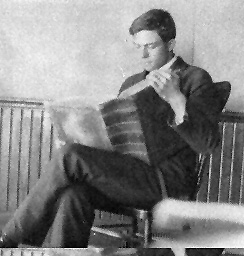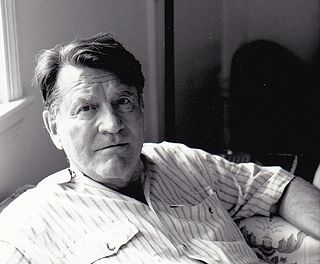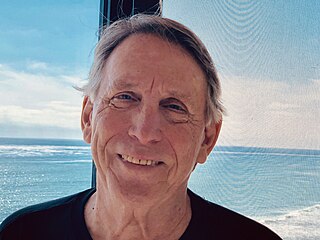
Hypnosis is a human condition involving focused attention, reduced peripheral awareness, and an enhanced capacity to respond to suggestion.
Hypnotherapy, also known as hypnotic medicine, is the use of hypnosis in psychotherapy. Hypnotherapy is generally not considered to be based on scientific evidence, and is rarely recommended in clinical practice guidelines. It is regarded as a type of alternative medicine.
Psychotherapy is the use of psychological methods, particularly when based on regular personal interaction, to help a person change behavior, increase happiness, and overcome problems. Psychotherapy aims to improve an individual's well-being and mental health, to resolve or mitigate troublesome behaviors, beliefs, compulsions, thoughts, or emotions, and to improve relationships and social skills. Numerous types of psychotherapy have been designed either for individual adults, families, or children and adolescents. Certain types of psychotherapy are considered evidence-based for treating some diagnosed mental disorders; other types have been criticized as pseudoscience.

Milton Hyland Erickson was an American psychiatrist and psychologist specializing in medical hypnosis and family therapy. He was the founding president of the American Society for Clinical Hypnosis. He is noted for his approach to the unconscious mind as creative and solution-generating. He is also noted for influencing brief therapy, strategic family therapy, family systems therapy, solution focused brief therapy, and neuro-linguistic programming.

Jay Douglas Haley was one of the founding figures of Problem-solving brief therapy and family therapy in general and of the strategic model of psychotherapy, and he was one of the more accomplished teachers, clinical supervisors, and authors in these disciplines.
Brief psychotherapy is an umbrella term for a variety of approaches to short-term, solution-oriented psychotherapy.
Jeffrey K. Zeig, is a writer, teacher and practitioner of psychotherapy. He has edited, co-edited, authored or coauthored more than 20 books on psychotherapy that appear in fourteen languages. He organises several conferences on psychotherapy, and is the founder and director of the Milton H. Erickson Foundation.
Leslie Samuel Greenberg is a Canadian psychologist born in Johannesburg, South Africa, and is one of the originators and primary developers of Emotion-Focused Therapy for individuals and couples. He is a professor emeritus of psychology at York University in Toronto, and also director of the Emotion-Focused Therapy Clinic in Toronto. His research has addressed questions regarding empathy, psychotherapy process, the therapeutic alliance, and emotion in human functioning.

Stephen R. Lankton, MSW, DAHB is a psychotherapist, consultant, and trainer. He is the current Editor-in-Chief of the American Journal of Clinical Hypnosis (2005–2025). He is a recipient of the American Society of Clinical Hypnosis' "Lifetime Achievement Award" and “Irving Sector Award for Advancement of the Field of Hypnosis”. as well as the Milton H. Erickson Foundation “Lifetime Achievement Award for Outstanding Contributions to the Field of Psychotherapy.”
Ivan Boszormenyi-Nagy was a Hungarian-American psychiatrist and one of the founders of the field of family therapy. Born Iván Nagy, his family name was changed to Böszörményi-Nagy during his childhood. He emigrated from Hungary to the United States in 1950, and he simplified his name to Ivan Boszormenyi-Nagy at the time of his naturalization as a US citizen.
Common factors theory, a theory guiding some research in clinical psychology and counseling psychology, proposes that different approaches and evidence-based practices in psychotherapy and counseling share common factors that account for much of the effectiveness of a psychological treatment. This is in contrast to the view that the effectiveness of psychotherapy and counseling is best explained by specific or unique factors that are suited to treatment of particular problems.

Helen Singer Kaplan was an Austrian-American sex therapist and the founder of the first clinic in the United States for sexual disorders established at a medical school. The New York Times described Kaplan as someone who was "considered a leader among scientific-oriented sex therapists. She was noted for her efforts to combine some of the insights and techniques of psychoanalysis with behavioral methods." She was also dubbed the "Sex Queen" because of her role as a pioneer in sex therapy during the sexual revolution in 1960s America, and because of her advocacy of the idea that people should enjoy sexual activity as much as possible, as opposed to seeing it as something dirty or harmful. The main purpose of her dissertation is to evaluate the psychosexual dysfunctions because these syndromes are among the most prevalent, worrying and distressing medical complaints of modern times.
Future-oriented therapy (FOT) and future-directed therapy (FDT) are approaches to psychotherapy that place greater emphasis on the future than on the past or present.
Gerald R. Weeks is an American author and lecturer. He has published 30 books on psychotherapy, which have been translated into multiple languages. He has published in the fields of individual, and family therapy, although he is best known for his work in sex and couple's therapy. Weeks is the founder of the Systems Approach to Sex Therapy as well as the founder of the Intersystem Approach to therapy which has been called one of the most ambitious efforts to develop an integrative approach to psychotherapy. He was a professor in the Marriage and Family Therapy Program at the University of Nevada-Las Vegas from 1999-2017. In 2017, he became Professor Emeritus as he retired from UNLV.
Family therapy is a branch of psychotherapy focused on families and couples in intimate relationships to nurture change and development. It tends to view change in terms of the systems of interaction between family members.

Michele Dee Klevens Ritterman is an American clinical psychologist and family therapist. She authored Using Hypnosis in Family Therapy, a book that integrates family therapy and hypnotherapy. Ritterman has worked extensively with survivors of political torture and their families. Her work has been translated into Spanish, German, Italian, and French.

Richard Fisch (1926–2011) was an American psychiatrist best known for his pioneering work in brief therapy.
Paradox psychology is a counter-intuitive approach that is primarily geared toward addressing treatment resistance. The method of paradoxical interventions (pdxi) is more focused, rapid, and effective than Motivational Interviewing. In addressing resistance, the method seeks to influence the clients' underlying attitude and perception by providing laser beam attention on strengthening the attachment-alliance. This is counter-intuitive to traditional methods since change is usually directed toward various aspects of behavior, emotions, and thinking. As it turns out, the better therapy is able to strengthen the alliance, the more these aspects of behavior will change.
Cloé Madanes has an educational background specialising in family and grief therapy. She is currently collaborating with Tony Robbins (2002) to train strategic interventionists in finding solutions to resolve interpersonal conflict, prevent violence, and contribute to the creation of a more cohesive and civil community.

Hypnoanalysis is the technique of using hypnosis in the practice of psychoanalysis and psychotherapy. It attempts to utilize the trance state induced by hypnosis to effect a conscious understanding of a person's unconscious psychodynamics.







